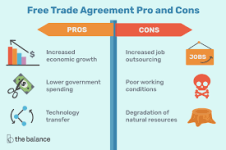Free trade has long been hailed as the engine driving economic growth, innovation, and international cooperation. By removing tariffs, quotas, and other barriers, it promises to create a level playing field where goods and services flow freely across borders. But is free trade always beneficial? The answer is far from simple and demands a deeper dive into its complexities.
On the surface, free trade seems like a win-win: countries specialize in what they do best, consumers enjoy lower prices, and businesses gain access to larger markets. Take the example of technology products—free trade has enabled global supply chains that bring affordable smartphones and computers to billions worldwide. Moreover, free trade encourages competition, pushing companies to innovate and improve efficiency.
However, the reality is more nuanced. While some sectors thrive, others suffer devastating consequences. Industries in developing or less competitive countries can collapse under the pressure of cheaper imports. This leads to job losses, economic displacement, and sometimes entire communities being left behind. The textile industry in parts of the US and Europe, for instance, shrank significantly with the rise of imports from countries with lower labor costs. These disruptions highlight that free trade can produce winners and losers, creating economic inequality both within and between nations.
Environmental and labor standards also come into question. Critics argue that free trade can incentivize a "race to the bottom," where countries lower regulations to attract business. This leads to poor working conditions, exploitation, and environmental degradation. Without global safeguards, free trade risks promoting unsustainable practices that hurt long-term growth and social welfare.
Moreover, free trade can undermine national sovereignty. When trade agreements are heavily influenced by multinational corporations, governments may lose control over policies essential for protecting public health, the environment, or workers’ rights.
So, is free trade always beneficial? The answer is no—not without careful management, fair rules, and strong social protections. Free trade must be paired with policies that support displaced workers, enforce labor and environmental standards, and ensure that the benefits of globalization are shared widely.
In a world increasingly interconnected yet divided, rethinking how we approach free trade is crucial to building an equitable and sustainable future.
On the surface, free trade seems like a win-win: countries specialize in what they do best, consumers enjoy lower prices, and businesses gain access to larger markets. Take the example of technology products—free trade has enabled global supply chains that bring affordable smartphones and computers to billions worldwide. Moreover, free trade encourages competition, pushing companies to innovate and improve efficiency.
However, the reality is more nuanced. While some sectors thrive, others suffer devastating consequences. Industries in developing or less competitive countries can collapse under the pressure of cheaper imports. This leads to job losses, economic displacement, and sometimes entire communities being left behind. The textile industry in parts of the US and Europe, for instance, shrank significantly with the rise of imports from countries with lower labor costs. These disruptions highlight that free trade can produce winners and losers, creating economic inequality both within and between nations.
Environmental and labor standards also come into question. Critics argue that free trade can incentivize a "race to the bottom," where countries lower regulations to attract business. This leads to poor working conditions, exploitation, and environmental degradation. Without global safeguards, free trade risks promoting unsustainable practices that hurt long-term growth and social welfare.
Moreover, free trade can undermine national sovereignty. When trade agreements are heavily influenced by multinational corporations, governments may lose control over policies essential for protecting public health, the environment, or workers’ rights.
So, is free trade always beneficial? The answer is no—not without careful management, fair rules, and strong social protections. Free trade must be paired with policies that support displaced workers, enforce labor and environmental standards, and ensure that the benefits of globalization are shared widely.
In a world increasingly interconnected yet divided, rethinking how we approach free trade is crucial to building an equitable and sustainable future.

